Mark Antony
- 82-30 BCE
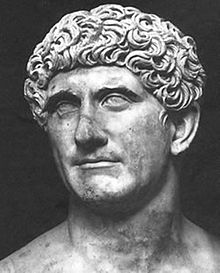
- in sole command after Caesar’s death
- Boisterous, extravagant, at drinker
- A gambler (aleator)
- March 17th: the Senate’s comprimise
- Assassins granted immunity and provinces; Caesar’s acta were confirmed
- Senate trying to avoid civil war
- Civil war averted (temporarily)
- Urban plebs and the army loyal to Caesar however
- Caesar’s will: left land and money to every Roman citizen
- Mark Antony tried to mobilize the populace in his interest
- Caesar’s public funeral
- Antony’s speech causes a riot which enables him to take control of Rome
- Cassius, Brutus and Cicero leave (in fear)
- Antony in firm control May 44 BCE
Marcus Tullius Cicero (death 43 BCE)
- politician and orator
Octavian
- Gaius Julius Caesar Octavianus
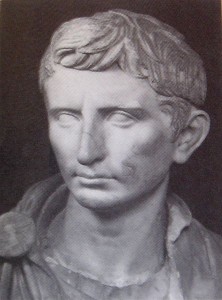
- 63 BCE – 14 CE
- Caesar’s great-nephew and adopted son and heir
- ¾ of Caesar’s estate
- (Caesar was very rich from time in Gaul)
- Turned to Antony but Antony rebuffed him
- Octavian realized he had more to gain from the Senate’s support
- Very young: 19 years old
- So young that he is underrated as a politician, everyone underestimates him
- Brutus and Cassius were overseas trying to get control of the eastern legions
- Control of the East would be crucial
- Next few months: shifting alliances
- October 44 BCE: Antony goes to Gaul, Octavian into Italy to raise troops
- Senate refuses to let Octavian stand for consul; thereby losing his support
- Octavian marched on Rome: Aug 43 BCE
- Declares himself consul
- The Senate has no armed forces with which to oppose him
The Second Triumvirate
- A modern name
- Octavian; Antony; M. Aemelius Lepidus (death 13 BCE)
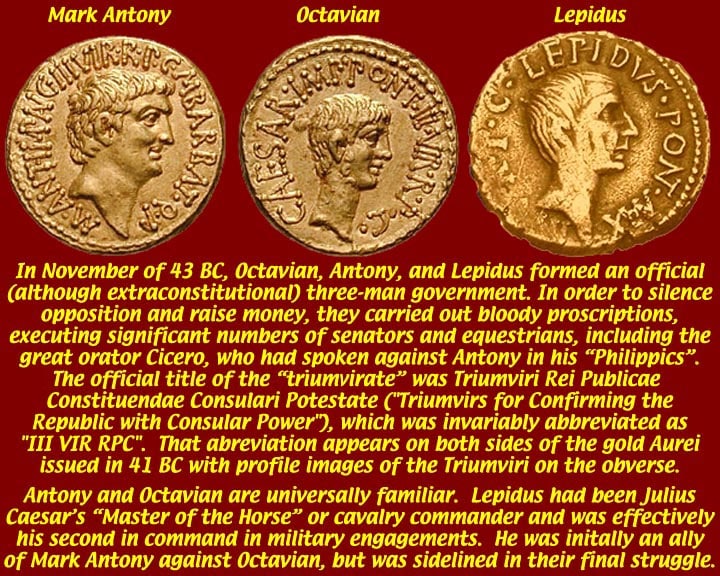
- ‘triumvirs for the purpose of restoring the Republic’
- 5-year period
- Authority to legislate and name magistrates
- The First Triumvirate had been an informal agreement with no legal ratification
- But this was a formal union; legally appointed by the Senate
- But could, like the first, dominate the Senate
Proscriptions
- Raise money to pay the troops
- Certain political security
- 300 senators and 2000 equestrians
- Cicero killed Dec 7th, 43 BCE
- Lepidus consul for 42 BCE
- Octavian and Antony go east to attack the ‘Republican’ forces
War
- Octavian and Antony: 28 legions
- = 140,000 men
- Battle of Philippi, 42 BCE
- Republicans defeated (Brutus and Cassius commit suicide)
- Their supporters surrendered or scattered
- Caesar’s murder was avenged
- The triumvirs disbanded their legions
- Octavian to stay in Italy
- Antony to go East to raise funds and re-establish order (boarder rebellions)
- For years the two oscillate between enmity and alliance
- They competed with each other fiercely
- Patched up their alliance by repeated pacts and comprimises
- Octavia, sister of Octavian, married to Antony in 40 BCE
- Strain soon becomes evident between the dynasts
Ptolemy XI
- Ptolemy Auletes – Cleopatra’s father
- Ascended 80 BCE but his reign marred by internal disputes
- Appealed to Rome in 59/58 BCE
- Rome put him back on the throne in 55
- He survived until 51 BCE
- Cleopatra VII (69-30 BCE) then ascended the throne, at 18 yrs old
- Along with her brother Ptolemy XIII (Married)
- Daughter of Ptolemy XI and Cleopatra V
Cleopatra’s VII’s early rule
- The snake pit
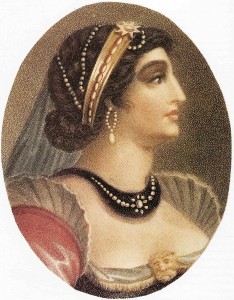
- She was 18; her brother and husband was 11
- Aimed for a position of strength
- Learned Egyptian (previously the royal family spoke Greek); cared about the economy
- Supported Rome in 49 BCE
- (Supplies Pompey with ships and supplies)
- Exiled in 48 BCE (by her brother’s supporters)
- Goes into Arabia and Palestine to raise an army
- Caesar puts her on the throne; they become lovers and have a son
- She travels to Rome in 46
- And stays there until March of 44 BCE (Caesar’s assassination)
- Antony approaches Cleopatra for troops and supplies to conquer Parthia
- He had met her while she was in Rome
- Antony’s seduction
- The barge scene
Anthony and Cleopatra
- Thus Cleopatra retained her kingdom and the support of Rome
- Twins were born in autumn 40 BCE: Alexander Helios (the sun) and Cleopatra Selene (the moon)
- Antony to marry Octavia (sister of Octavian) to cement their political alliance (40 BCE)
- By 37, the marriage AND the political alliance were breaking down
- Antony goes east to Cleopatra
- 37/36 BCE: Antony adds some of his conquests to Cleopatra’s domain
- In 36 she gives birth to their third child Ptolemy Philadelphus
- 34 (important year): he formally married her (under Macedonian law) and recognizes their children (makes them his heirs)
- large tactical error
- he is still married to Octavia at this point
- And gives them control over parts of the Roman empire
- Results in mistrust from the Romans
- 33 BCE: campaign of mutual slander
- Antony is painted as a drunkard, demoralized, soft, in sexual thrall
- 32: alliance at end; Antony divorced Octavia
- Incensed, Octavian seized Antony’s will and made it public
- The terms of the will outraged the Roman people
- Antony had instituted Cleopatra and his children of his heirs (and cut out his legitimate Roman children) also requested to be buried in Egypt with Cleopatra
War
- War is declared (be Octavian) against Cleopatra
- Not on Antony, because didn’t want to start a civil war
- Octavian crosses to Greece
- Antony had the strong support of many, but desertions were high
- Battle of Actium: September 31 BCE (naval battle)
- Cleopatra and Antony defeated; their troops surrender or are captured
- Octavian left sole master of Rome and all her territories
- They retreat to Egypt
- Octavian follows
- Numerous pleas from the pair to Octavian are rejected
After Actium
- Octavian follows the pain to Egypt
- Alexandria capitulates in 30 BCE
- Antony and Cleopatra commit suicide
- Antony: by his sword
- Cleopatra: snake bite
- Luxurious supper-parties with plenty of drinking (put on by Antony and Cleopatra)
- Elegant and extravagant lifestyle
- Cleopatra reportedly tested out various poisons on her slaves
- Bite of an asp (snake) produced lethargy and numbness
- Egyptians also believed the bite deified the victim
Antony’s Death
- Ghostly Bacchic possession out of Alexandria
- The god Dionysus was abandoning him (i.e., so bad things were going to happen)
- His navy and cavalry deserted; he blamed Cleopatra (for being Egyptian)
- She fled to her funerary monument
- Antony thinking she was dead plunged his sword into his belly
- Cleopatra took him into her monument
- He died in her arms
- Octavian wept upon hearing of Antony’s death
Cleopatra’s death
- Octavian worried she would kill herself
- Interview with Octavian before her death (she did not come off as very brave)
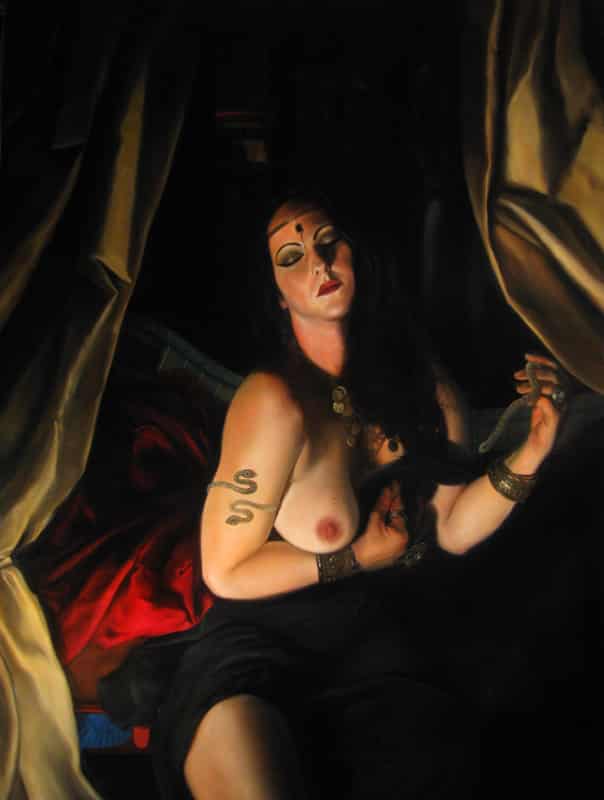
- She visits Antony’s tomb one last time, bathes and eats
- Basket of figs containing an asp
- Addressed a letter to Octavian (basically saying she would be dead once he read this)
- Dismisses all her servants except Charmian and Iras
- Slips her wrist into the basket (and asp bites her wrist)
- Octavian ordered her to be given a royal burial
- Caesarion (Caesar’s son) executed on Octavian’s orders
- Her children by Antony brought up by Octavia in Rome
Cleopatra’s story
- Cleopatra of myth and fantasy as well as history
- Cleopatra’s story is one of sex, death, and power
- Can be treated in witty or tragic fashion
- Disgrace? Temptress? Victim? Great leader?
- Gets re-invented from generation to generation
- (according to their own ideas of women and power)
- Examples of some portrayals:
- Theda Bara, 1917 (silent film): exotic temptress
- Claudette Colbert, 1934; witty society lady
- Elizabeth Taylor, 1963: political visionary
- Lindsay Marshal, 2005 (show we watched in class); characterized as very young, aggressive, sexually promiscuous, opium addict, indulgent, spoiled
- Exceptionally able, ambitious, intelligent women
- She was not conventionally beautiful
- 5’2”, chunky and hawk-nosed
- But charismatic, witty, a great conversationalist
- Sexually compelling
Cleopatra in European Art
- France, 1480: Antony and Cleopatra’s death (he is stabbing himself, she is getting bit in both breasts by two snakes; dressed in medieval clothing)
- 1630, Barbieri, Italian: sketch of her, no shirt
- Renault, 1790, France: wrapped in cloth, but bare breasts, holding her breast
- Rixens, 1876: her death (she is naked) with her two servants Charmian and Iras
- Even today still using her in portrayals such as advertisements

Hello,
Can you tell me the origin of your last illustration on Cleopatra Death ?
With my best regards.
Renan Pollès